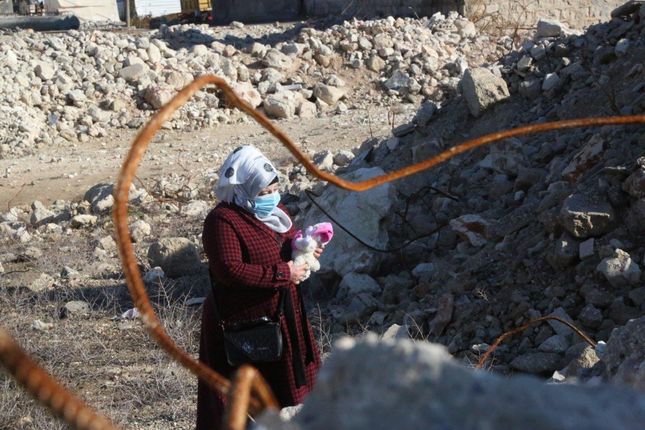
Earthquake in Syria, one year later: “With every passing day, the needs left by the earthquake tragedy increase.”
Supported by a medical staff member of our partner organization Hand in Hand for Aid and Development (HIHFAD), Khatmah Al-Issa returns to her tent with small, slow steps. The tent stands in a camp for internally displaced people, close to the small city of Kafr Arouq in northwestern Syria, and has been her home for almost a year now. In her long life, Khatmah Al-Issa has been through a lot, has lost her husband and survived more than 10 years of war, and finally had to leave her house where she had lived with her daughter and son-in-law until the earthquake. Now she finds herself all alone.
"In eighty years of my life, this earthquake is the worst disaster to hit the area.”
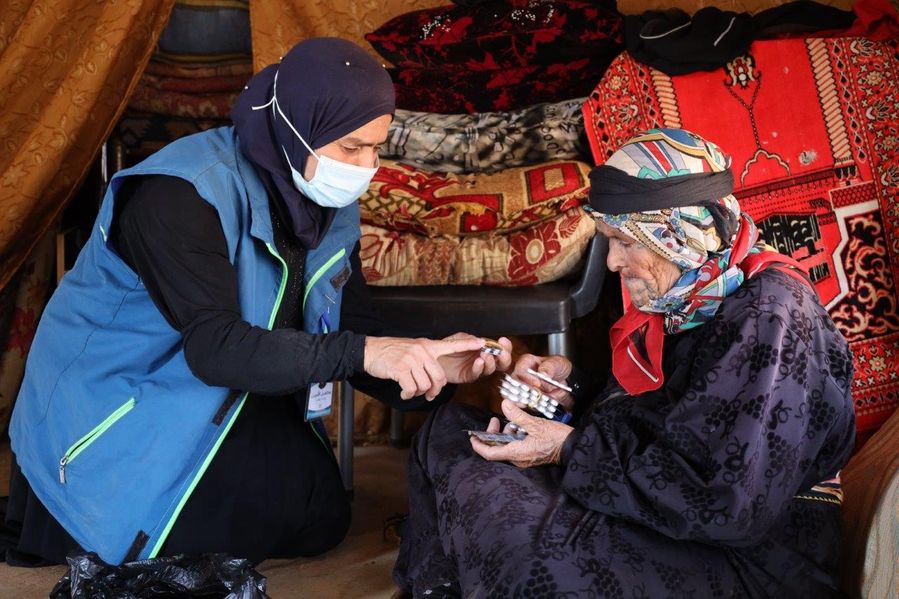
Khatmah Al-Issa’s daughter and her husband have moved to Aleppo after the catastrophe. She herself could not bring herself to leave her damaged house behind, for fear of losing it for good. Her health has deteriorated significantly since moving into the tent, were the wet and cold winters are very challenging. That is why she often visits the Kafr Arouq Medical Center, maintained by our partner organization. There she does not only receive vital medication, but just as vital human relations. She says: “There is a great need to support the camps with essential healthcare services and medical care, urgently needed for seniors like me and for everyone here in the camp."
„My long-lasting dream is to see children live safely away from war and earthquakes."
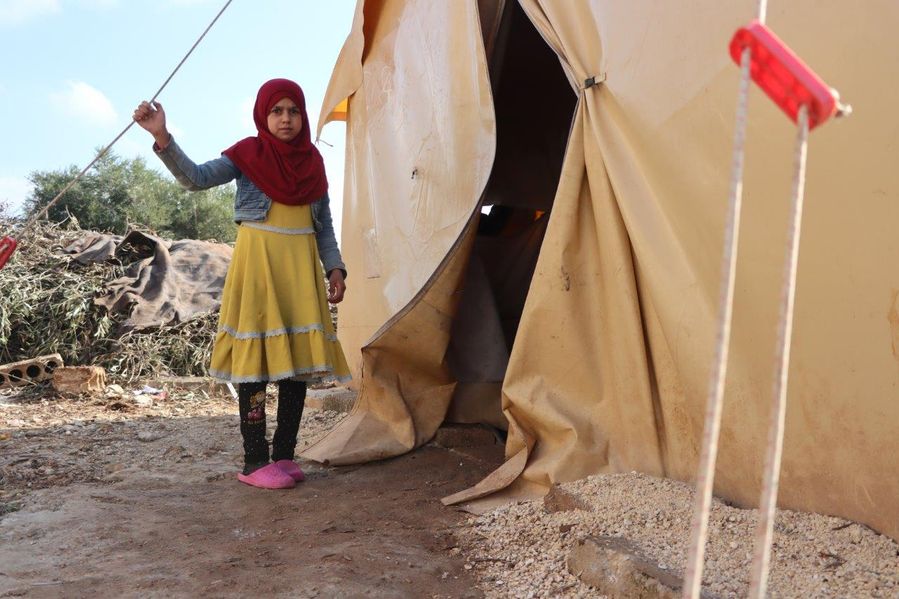
Areej is small for her 15 years. She is constantly in need of medicine because of her impaired growth that she has been suffering from since birth. For as long as she can remember, she only knows a life in war. Then the earthquake hit, and it was like a nightmare for the young girl, even though her family had been extremely lucky: When the walls of their home began to shake violently, they blindly ran for their lives, out into the pouring rain of that night. A few hours later, they began to hear the stories of children and adults who perished under the rubble before rescue teams reached them.
Minor earthquakes are frequent in the region, and out of fear of a repetition of last year’s nightmare night, Areej and her family still spend most nights in a tent. Her father received it as emergency relief and erected next to their damaged house. Areej says, “I dream of completing my education, which was interrupted last year due to the additional expenses my father spends, in addition to medicines.” She is sure that the consequences of the earthquake will have a lasting impact on children her age.
Finding her grandson under the rubble was like a miracle for Maryam
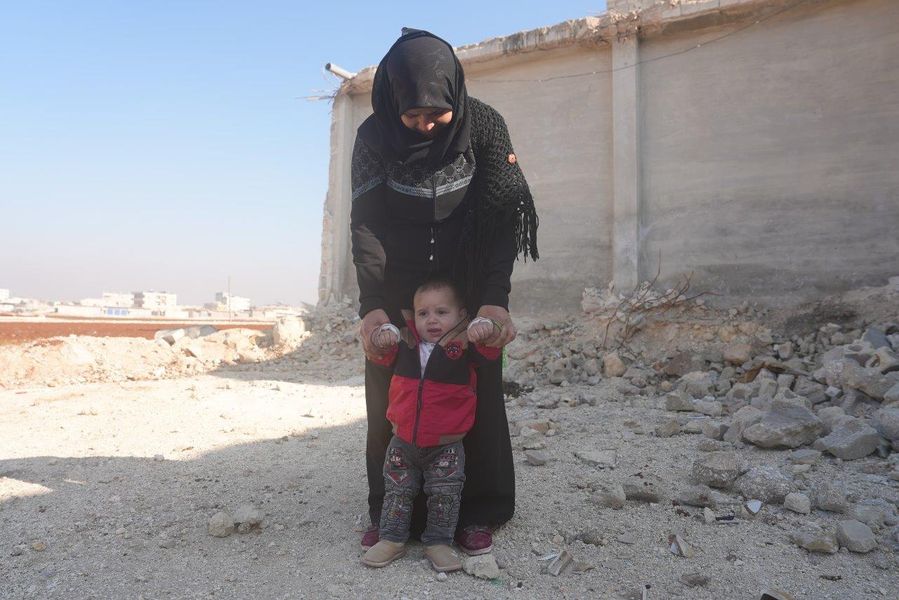
At the end of January 2023, Maryam Ahmed Al-Badawi was very happy: Her son and her daughter-in-law had just had a baby, a sweet little boy named Abdul Hasib. 14 days later, Maryam pulled her grandson from the rubble that had been their house only hours before. That the tiny baby had survived seemed like a miracle to her. Her son was dead and her daughter-in-law so grief-stricken that she was unable to take care of Abdul Hasib, and entrusted him to Maryam. Since then, they have formed an unbreakable bond.
In the midst of tragedy; Maryam's love and devotion became Abdul Hasib’s guiding light. In the evenings, she tells him stories about his family, and she hopes that one day he will be proud of his ancestors and the challenges they have overcome as a family.
Abdul Hasib is now almost one year old and a healthy, lively little boy. But his former family home is still in ruins, and the challenges for his family and the other affected people in his region have yet to be overcome.
Like in Maryam’s family, many men, who are traditionally the main earners in Syria, have been killed in the earthquake. We support female-headed households and people with disability with training for food processing, food marketing and small business development to procure additional income.
Against all odds: Hala's journey to motherhood
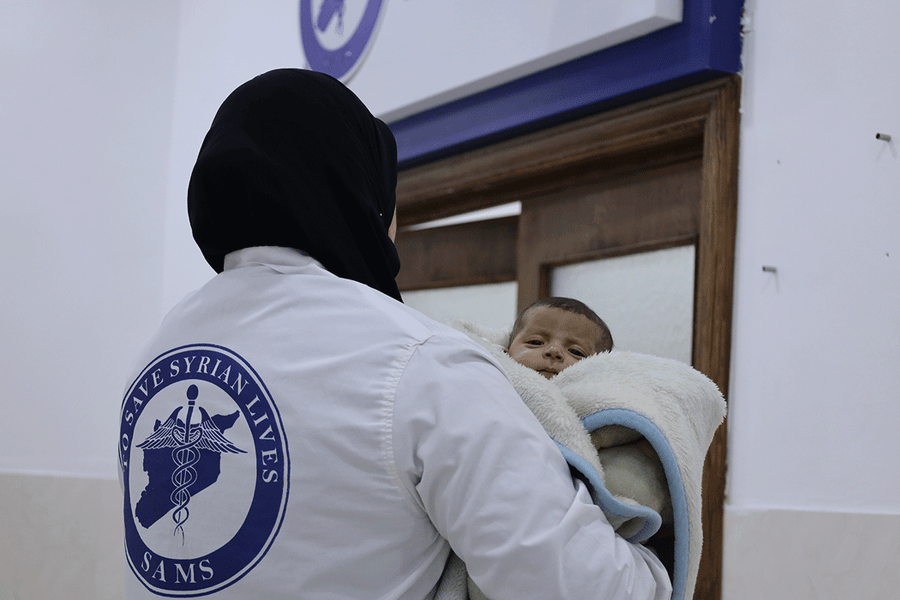
Hala will never forget the day the devastating earthquake struck, but she will also never forget June 7, 2023, almost four months later. At nine months pregnant with twins, she was struck by a double tragedy: the first fetus was in an unfavorable position for delivery, and the second was already deceased. The area where she lived, Dana, in northwest Syria, was also being heavily bombed.
Despite these harrowing circumstances, the 35-year-old Syrian woman defied the odds and welcomed a healthy baby. Amidst the ongoing bombings, the maternity clinic operated by our partner organization, SAMS, continued to provide essential care, admitting and attending to emergency cases. On that fateful day, Dr. Nawal Shahwan took over Hala's care, monitoring her closely throughout the night to ensure the safety of both mother and child. After a thorough examination, Hala and her newborn were discharged in good health.
Hala recounts, "I faced the fear of losing my child twice – first during the earthquake when our house's roof collapsed on top of us. By God's grace, we survived. The second instance was during the bombing, just as I was about to give birth. My child and I, against all odds, emerged unharmed once again."
Hala's story is a testament to the resilience of Syrian women, who face immense challenges during their pregnancies. The ongoing conflict as well as the consequences of the earthquakes pose significant risks to both expectant mothers and their children. Together with our partner on the ground, we are committed to providing safe childbirths in a maternity clinic in northwest Syria. This clinic is providing essential care to women like Hala, ensuring that they can experience the joy of motherhood even amidst chaos and destruction.
The stories of Maryam, Abdul Hassib, Khatmah Al-Issa, Areej and Hala are representative of many people in their region who still live in fear because of the earthquakes and its consequences. Even to this day, they live in tents or in houses that are not earthquake proof and often damaged. In the midst of financial constraints, job scarcity, educational and healthcare gaps, and a rising shortage of water and food, they've shown remarkable resilience which helps them get through the crisis - day by day, step by step.
More voices from people affected by the earthquake
Unfortunately, we cannot tell every story here that has been reported to us by our colleagues on the ground. But before we close, we would like to let some more people speak:
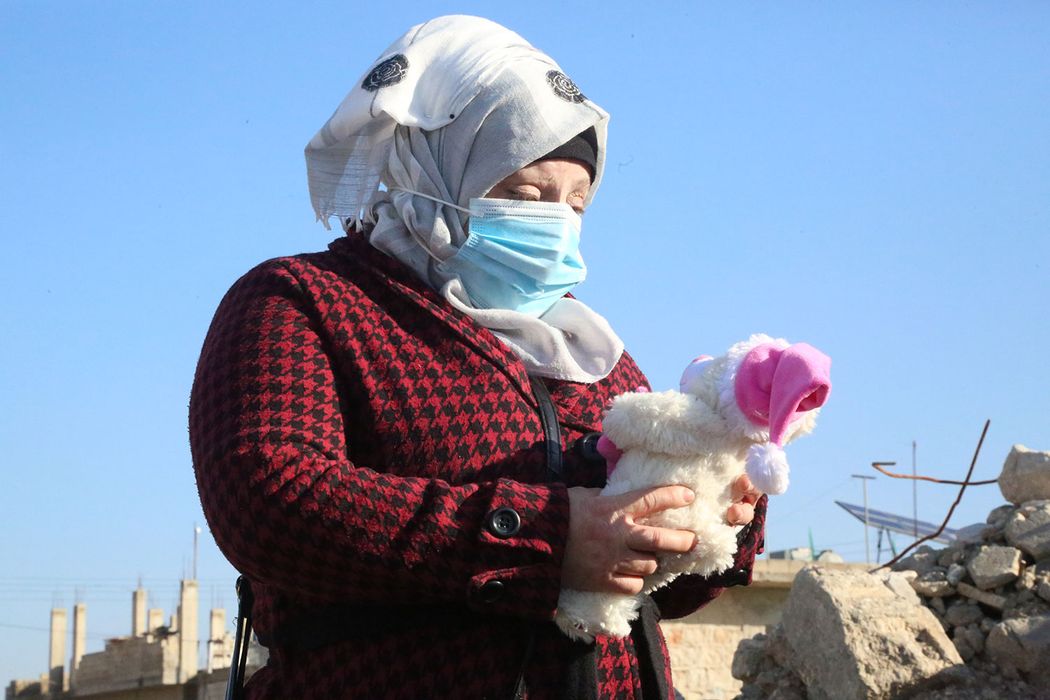
Haifa Ahmed Hassan lost her home, her brother-in-law, her sister and their six children in the earthquake. There was no time for mourning. After only three days, she had to continue working, because now she has to take care of herself and her elderly parents alone: “After the earthquake, the situation of people was tragic, as those who lost their homes were not compensated, and no initiatives were launched to rebuild homes for those affected. But people here do not have the ability to rebuild their homes or cover the costs accumulated due to displacement and the loss of family members or housing. Nearly a year has passed, and the situation has not improved.”
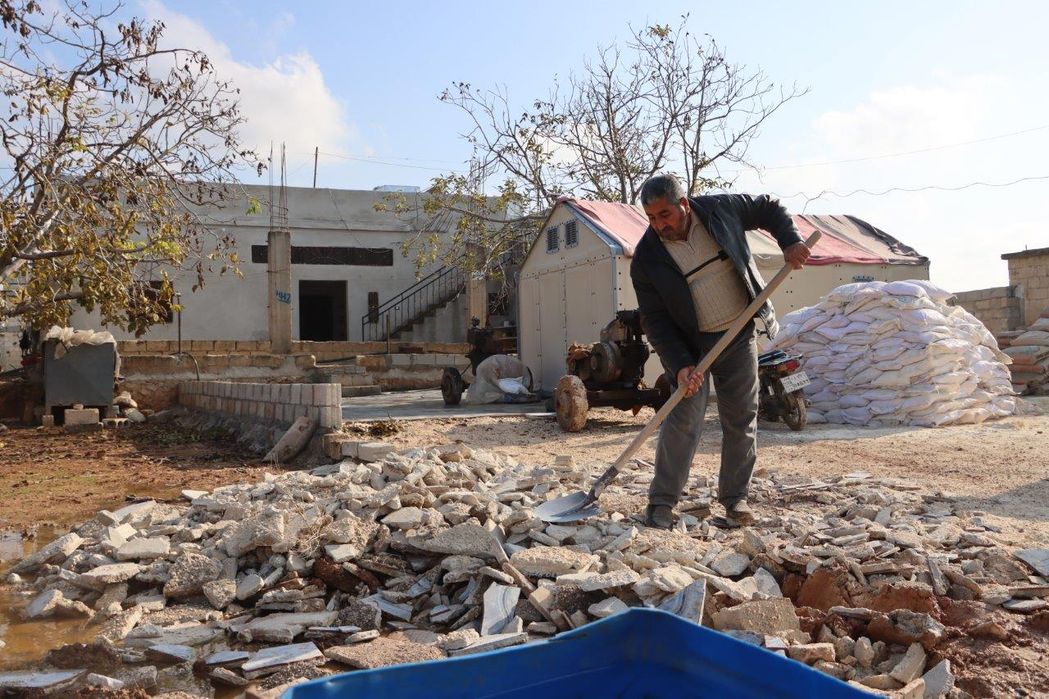
Abdulrahman Hammada lives in the same village as Areej. After the earthquake, he lost his job in education: “I strive to provide a safe place for my seven children, the nature of the buildings in the area does not provide the required level of safety as earthquake resistant. Today, I believe that providing job opportunities for those affected is the first need.”
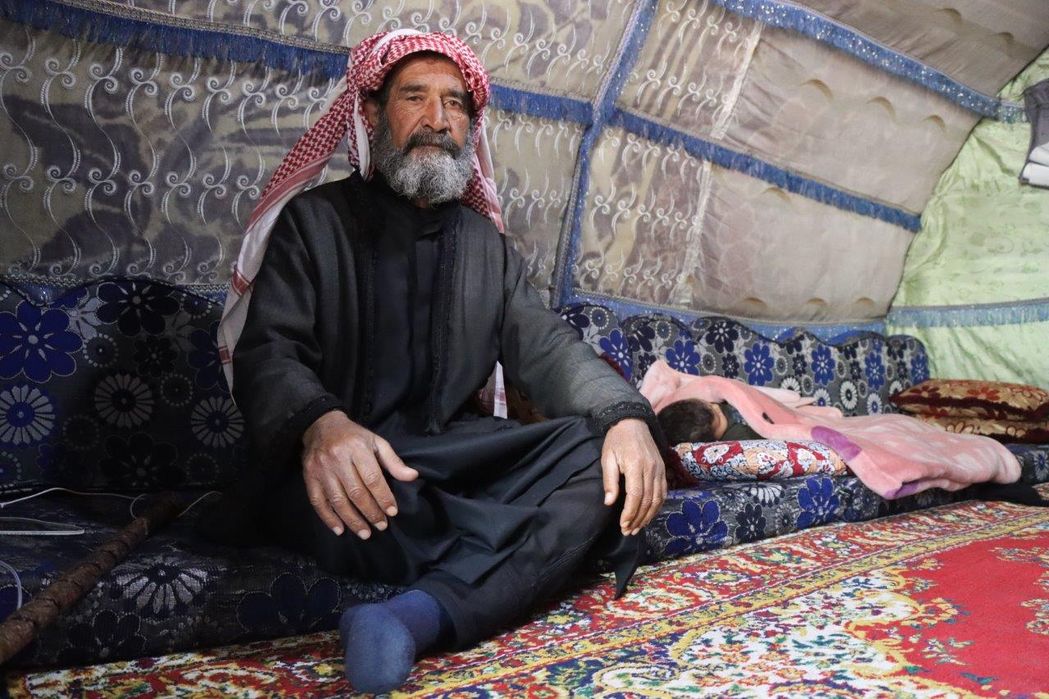
Abu Ammar was displaced six years ago from his former home due to bombings, and had to leave his new home as well last year. He now resides in a camp with his family of four and his son's family with their three children: “As these long years [of war] passed, we continued to persevere and strive to build a new life. Today we are in the camps, a year after the earthquake, where we lack the most basic necessities of life, and have lost everything we own.” We were able to support Abu Ammar with the distribution of hygiene kits and health care via our partner organizations. But the families in the camp are in dire need of more support, as food assistance in particular has been shrinking dramatically due to lack of financing.
We supported and continue to support the affected people in Syria and Türkiye together with our local partner organizations IDA, HIHFAD, SAMS, TRC, SARD, Orange and Shafak with various activities from the running of clinics to the distribution of hygiene kits and blankets to the support of start-ups. Among the income generating measures, we especially support agricultural projects and female-headed households with cash distribution, training, seeds and equipment. With our partner organizations, we also help rebuilding the water network e.g. by erecting water towers and installing wells.








